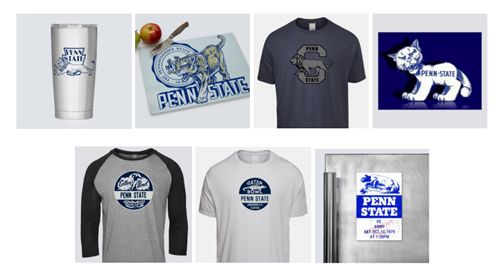- within Intellectual Property topic(s)
- in United States
- with readers working within the Banking & Credit and Retail & Leisure industries
In a closely watched trademark dispute, a Pennsylvania jury recently held that Vintage Brand LLC ("Vintage Brand"), Sportwear, Inc., and Chad Hartvigson (collectively, the "Defendants") had infringed Pennsylvania State University's ("Penn State") trademarks by selling unauthorized merchandise incorporating Penn State's trademarks, including the "PENN STATE" name.1 Brand owners expressed concern that a different verdict would open their marks to rampant misuse on merchandise.
At the heart of the case was a trademark infringement dispute between Penn State and Vintage Brand, a company that sold merchandise featuring Penn State's trademarks and logos, including the university's name and related branding and historical imagery. Penn State argued that Vintage Brand was using its trademarks without a license, which not only violated the university's intellectual property rights, but caused consumer confusion regarding the origin of Vintage Brand's products.

The Pennsylvania State University v. Vintage Brand LLC et al., case number 4:21-cv-01091 (M.D. Pa.) Dkt. 1 at p.17
Vintage Brand defended itself by asserting fair use, claiming its merchandise represented nostalgic or vintage items that should not be considered official Penn State University products. Vintage Brand contended that the public understood these items as "vintage" and not affiliated with Penn State, and thus their use should fall under exceptions for non-commercial or artistic uses of trademarks. Vintage Brand also asserted that its inclusion of non-affiliation notices on the "hang tags" for its products was sufficient to make clear to consumers that its merchandise was not sponsored by, or affiliated with, Penn State. Additionally, Vintage argued that its use of the historical images incorporating Penn State's trademarks was merely "ornamental," and does not convey that Vintage's merchandise was produced by or affiliated with Penn State. (This is a common objection made by the US Trademark Office in response to specimens of use of this nature.) Vintage Brand also counterclaimed that certain Penn State-registered trademarks for its Penn State Seal Marks should be canceled on the ground that the marks incorporate the Commonwealth of Pennsylvania's Coat of Arms, and that the PENN STATE marks should be canceled because they are merely ornamental and fail to function as trademarks.
The jury sided with Penn State, finding that Vintage Brand's use of Penn State's trademarks was likely to cause confusion among consumers regarding the source or endorsement of Vintage Brand's goods and ruled that Penn State's trademarks should not be canceled. The jury awarded Penn State $28,000 in damages, with the most significant value being that the verdict that ensures Penn State's right to control the use of its intellectual property associated with the university's reputation and identity.
The verdict affirms the rights of brand owners to control the way their source-identifying intellectual property is used and presents an opportunity for brand owners to review their trademark protection and enforcement strategies and their licensing programs to ensure they are maximizing the strength and value of their brands. Below are some tips brand owners may find helpful:
- Monitor and Take Action Against Unauthorized Use. It is important to monitor for infringing trademark uses, and take affirmative actions to stop unauthorized uses when identified. Licensees will be less willing to pay licensing fees if third parties are using a trademark without permission.
- Register Trademarks. Ensure that your brand is protected. Registering trademarks makes enforcement easier, provides nationwide priority of use, provides the potential for a broader range of damages, and affords the right to register with Customs and Border Protection to stop imports of infringing products, among other benefits.
- Quality Control. It is critical to maintain quality control over trademark use by licensees. Without an appropriate license agreement, a brand owner can lose its trademark rights.
Footnote
1. The Pennsylvania State University v. Vintage Brand LLC et al., case number 4:21-cv-01091 (M.D. Pa.).
Visit us at mayerbrown.com
Mayer Brown is a global services provider comprising associated legal practices that are separate entities, including Mayer Brown LLP (Illinois, USA), Mayer Brown International LLP (England & Wales), Mayer Brown (a Hong Kong partnership) and Tauil & Chequer Advogados (a Brazilian law partnership) and non-legal service providers, which provide consultancy services (collectively, the "Mayer Brown Practices"). The Mayer Brown Practices are established in various jurisdictions and may be a legal person or a partnership. PK Wong & Nair LLC ("PKWN") is the constituent Singapore law practice of our licensed joint law venture in Singapore, Mayer Brown PK Wong & Nair Pte. Ltd. Details of the individual Mayer Brown Practices and PKWN can be found in the Legal Notices section of our website. "Mayer Brown" and the Mayer Brown logo are the trademarks of Mayer Brown.
© Copyright 2024. The Mayer Brown Practices. All rights reserved.
This Mayer Brown article provides information and comments on legal issues and developments of interest. The foregoing is not a comprehensive treatment of the subject matter covered and is not intended to provide legal advice. Readers should seek specific legal advice before taking any action with respect to the matters discussed herein.



